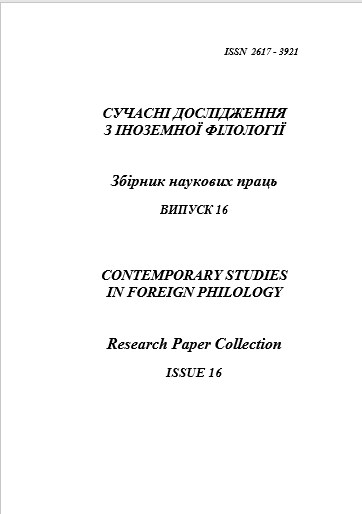Word-formation Strategies of Native and Non-native (French) Speakers of English: a Cognitive Onomasiological Approach to the Study of Formal Economy and Semantic Transparency in Word-formation
DOI:
https://doi.org/10.24144/2617-3921.2018.16.%25pАнотація
Анотація.У статті визначено словотвірні стратегії, характерні для носіїв мови та тих, хто не є її носіями з ономасіологічної точки зору. Стратегії розглянуто в ракурсі когнітивної ономасіологічної теорії словотвору за допомогою так званих онмасіологічних типів, які служать інструментом для класифікації номінацій відповідно до різних ступенів неясності значення та економії вираження. Продемонстровано, що ті, хто є неносіями мови, виявляють тенденцію до неясності значення більше, ніж до економії вираження.
Ключові слова: словотвірні стратегії, носії та неносії мови, когнітивні ономасіологічна теорія, неясність значення, економія вираження.
Abstract.The paper examines preferred word-formation strategies of native and non-native speakers of English from an onomasiological perspective. The strategies are examined within a Cognitive Onomasiological Theory of Word-formation, by means of the so-called Onomasiological Types that serve as tools for classifying the created naming units according to different degrees of transparency of meaning and economy of expression. What was expected is demonstrated in the measurable stronger preferences of the non-native speakers towards transparency of meaning rather than towards economy of expression.
Keywords: word-formation strategies, native and non-native speakers, Cogniitive Onomasiological Theory, onomasiological types, transparency of meaning, economy of expression.
##submission.downloads##
Опубліковано
Номер
Розділ
Ліцензія
Автори, які публікуються у цьому журналі, погоджуються з наступними умовами:
- Автори залишають за собою право на авторство своєї роботи та передають журналу право першої публікації цієї роботи на умовах ліцензії Creative Commons Attribution License, котра дозволяє іншим особам вільно розповсюджувати опубліковану роботу з обов'язковим посиланням на авторів оригінальної роботи та першу публікацію роботи у цьому журналі.
- Автори мають право укладати самостійні додаткові угоди щодо неексклюзивного розповсюдження роботи у тому вигляді, в якому вона була опублікована цим журналом (наприклад, розміщувати роботу в електронному сховищі установи або публікувати у складі монографії), за умови збереження посилання на першу публікацію роботи у цьому журналі.
- Політика журналу дозволяє і заохочує розміщення авторами в мережі Інтернет (наприклад, у сховищах установ або на особистих веб-сайтах) рукопису роботи, як до подання цього рукопису до редакції, так і під час його редакційного опрацювання, оскільки це сприяє виникненню продуктивної наукової дискусії та позитивно позначається на оперативності та динаміці цитування опублікованої роботи (див. The Effect of Open Access).

